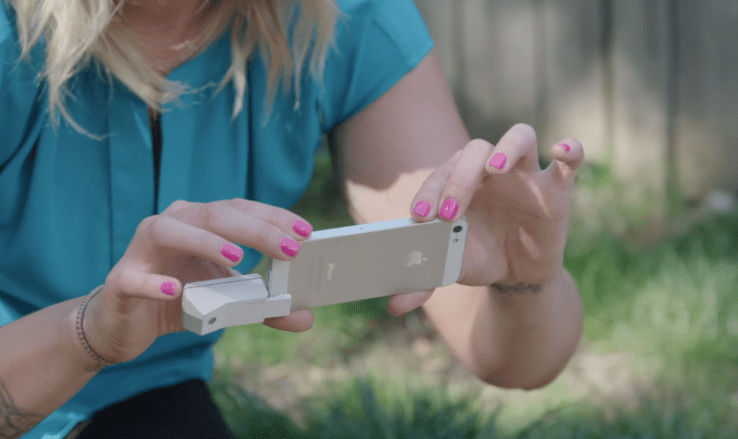
Here at TechCrunch we’re eagerly awaiting the day when 3D photographs are just as mainstream as traditional ones. We even have an ongoing collection of some TC writers modeled in 3D.
However, like many early technologies, 3D capture devices are mostly too expensive and complicated to cater to the masses.
Canadian company Matter and Form is aiming to change this with Bevel, a device that plugs into your phone’s audio jack and allows it to capture 3D photographs. The device is currently in the midst of a $200,000 Kickstarter campaign, and eventually will retail for $49.
Bevel uses an eye-safe laser that acts as a fixed light source to capture scale and geometric detail, while your phone’s camera captures color, texture and other details. The result is a 360-degree model that you can rotate, zoom and even 3D-print.

Notably, the device and software will also work across a variety of phones and platforms, since it will ship with a calibration card that will help it adjust for various phone sizes and headphone jack locations.
Bevel will also come with a companion app, which will allow users to capture and share these 3D models.
While the company said these captured images will probably be saved in a proprietary format, the app will allow them to be exportable in common 3D formats so they can be printed or imported into other software.
Matter and Form is also launching Cashew, which is the company’s new (still in beta) online platform to upload and share 3D content.
While Cashew is similar to existing services like Sketchfab, users should benefit from the easy ability to upload to Cashew directly from the Bevel app. Cashew will also allow users to send models directly to 3D printing services like Shapeways.
Matter and Form already has experience launching 3D hardware products. Last year, they launched a relatively affordable 3D scanner, which we took a look at in a hands-on review. Now, the company is bringing 3D scanning to the masses, with the very affordably priced Bevel.
The company’s end goal is to allow users to create and consume 3D media “without all of the BS that comes with traditional 3D software and programs.” Drew Cox, founder and CEO of Matter and Form, emphasized that most hardware and software in the 3D ecosystem was developed a long time ago, and isn’t very intuitive.
The devices are expected to ship late Q4/early Q1 2016 and can be preordered on Kickstarter now.

Comments
Post a Comment